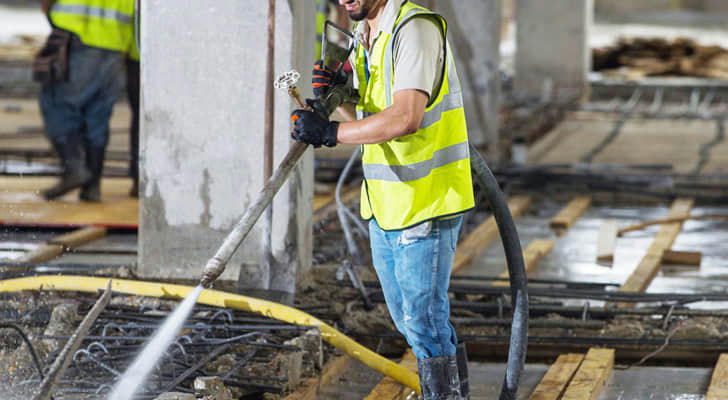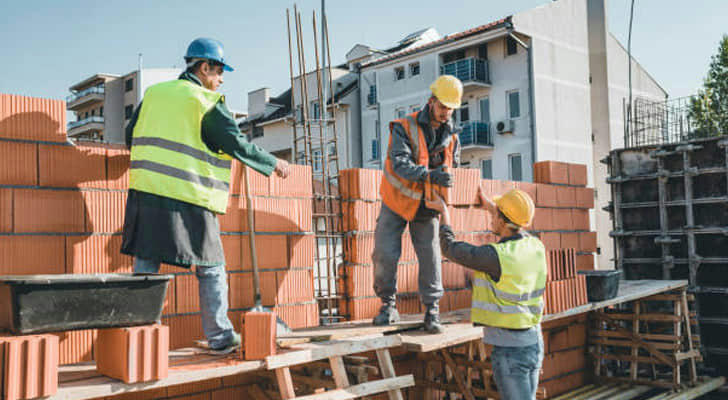The Rise of the Construction Industry: New Forces in the Global Market

The construction industry is a vital pillar of the global economy. Whether it’s infrastructure development, commercial buildings, or residential projects, construction workers play an indispensable role. With the acceleration of urbanization and infrastructure upgrades in various countries, the demand for the construction industry is rapidly increasing. Not only is there a growing need for construction workers in terms of numbers, but skilled craftsmen are also in short supply. This profession offers numerous opportunities, high income, and relatively low entry barriers, requiring little prior experience. Through specialized training, anyone can quickly acquire the basic skills needed to easily enter the industry and embark on a stable and high-paying career path.
Strong Industry Demand:
As global infrastructure construction and urbanization accelerate, the number of projects in the construction industry continues to rise, keeping construction workers in high demand. Whether for new projects or maintenance and repairs, the skills of construction workers are essential.
High Salary and Stability:
Construction workers belong to skilled trades, and as their skill levels improve, their salaries increase accordingly. Especially in projects with high technical demands and tight deadlines, the income of construction workers can be particularly lucrative. Even during economic fluctuations, the fundamental demand in the construction industry ensures a relatively stable career position for construction workers.
Significant Career Advancement Opportunities:
There is a clear promotion path from entry-level construction worker to skilled craftsman, foreman, and even project manager. Through experience accumulation and skill enhancement, career prospects continually broaden, leading to increased income and higher positions.
Low Entry Barriers:
The entry threshold for construction workers is relatively low, with many positions not requiring educational credentials or experience. Through short-term vocational training, inexperienced individuals can quickly grasp core skills and easily enter the construction industry.
Global Opportunities:
The construction industry has a global demand, allowing construction workers to find job opportunities in various countries and regions, particularly in developing nations and rapidly growing economies where career prospects are especially promising.

1. Comprehensive Training Content
Basic Theory Training:
•Safety Knowledge: The first step in training is learning the safety regulations on construction sites, including the use of personal protective equipment, identification of safety signs, and emergency response procedures.
•Understanding Building Materials and Tools: Familiarize oneself with various construction materials (such as concrete, bricks, and rebar) and their applications, as well as learning about the types and operation of construction tools and equipment, such as hammers, shovels, and power tools.
2. Technical Skills Learning
•Basic Construction Skills: This includes bricklaying, concrete pouring, basic carpentry, and rebar tying, focusing on practical operations like wall construction and foundation excavation.
•Measuring and Blueprint Interpretation: Mastering the use of construction measuring tools (like levels and tape measures) and learning to interpret basic construction blueprints, which is crucial for ensuring construction accuracy.
3. Practical Training
•On-Site Training: Engage in hands-on training in real or simulated construction site environments to enhance practical skills. Trainees participate in actual construction projects, experiencing the entire process from foundation laying to wall construction.
•Teamwork and Communication Training: Since construction workers often need to collaborate with other workers and engineers, trainees learn effective communication and teamwork skills to ensure smooth construction processes.
4. Advanced Skills Training
•Professional Skill Enhancement: For trainees with some foundational experience, advanced training covers more complex construction techniques, such as fine carpentry, concrete structure construction, and steel structure welding. Trainees also learn about the maintenance and care of construction equipment.
•Quality Control and Standards: Understanding how to ensure construction quality meets industry standards through on-site inspections and measurements.
5. Professional Certification and Qualification
•Obtaining Industry Certification: Upon completing training, trainees have the opportunity to take exams for industry-recognized construction worker qualifications. This not only guarantees employment but also helps workers quickly advance in their careers.
6. Employment Guidance and Recommendations
•Job Counseling: Many training institutions provide job counseling and referral services, assisting trainees in finding suitable construction job positions. The skills and experience accumulated through training enable traine
es to quickly integrate into the construction industry and begin new career paths.

I. Main Job Responsibilities of Construction Workers
Basic Construction:
Responsible for foundation excavation and concrete pouring to ensure building structure stability.
Collaborate with engineers for foundation piling, bricklaying, and stone paving tasks.
Concrete and Masonry Work:
Participate in the mixing, pouring, and forming of concrete, ensuring construction follows blueprints.
Use masonry techniques to lay bricks and construct walls, adhering to construction standards.
Rebar Tying and Carpentry:
Tie rebar according to blueprints to ensure the strength of the building framework.
Participate in constructing wooden frameworks and formwork to provide a base for concrete pouring.
Equipment Use and Maintenance:
Utilize various construction tools and equipment such as electric hammers, drills, and mixers to ensure efficiency and quality.
Handle daily maintenance and minor repairs of equipment to ensure smooth operation.
Installation and Repair:
Responsible for installing doors, windows, staircases, and railings. Participate in repairs and renovations of buildings, including patching cracks and adjusting structures.
Site Cleanup and Material Handling:
Maintain cleanliness on the construction site during the construction process.
Transport construction materials to ensure the necessary supplies are available on site.

II. Skills Required for Construction Workers
Basic Measurement and Blueprint Reading Skills:
Mastery of measurement tools (like levels and tape measures) to ensure precision in construction.
Ability to read basic architectural design blueprints and construct according to specifications.
Proficient Tool Operation:
Familiarity with various construction tools and equipment, including power tools and machinery, demonstrating good hands-on skills and equipment operation experience.
Recognition and Application of Building Materials:
Understanding the characteristics and uses of different construction materials, enabling the selection and application of materials like concrete, rebar, and bricks based on project needs.
Construction Safety and Quality Control:
Familiarity with site safety regulations and strict adherence to safety practices to prevent accidents.
Quality control awareness to ensure construction meets industry standards and requirements.
Teamwork and Communication Skills:
Construction workers typically work in teams, requiring good teamwork spirit and the ability to collaborate closely with engineers, supervisors, and other workers to ensure timely project completion.
Basic communication skills to express needs and problems effectively and to address construction issues promptly.
Physical Strength and Endurance:
Construction work often requires high physical demands, as workers need to engage in physically strenuous tasks like moving materials and operating heavy tools, necessitating sufficient physical fitness and stamina to adapt to the site environment.

III. Additional Skills (for Advanced Workers)
Precision Techniques and Craftsmanship:
Ability to perform intricate construction tasks, such as fine carpentry, tile laying, and application of decorative materials, enhancing the aesthetics and quality of buildings.
Equipment Repair and Maintenance:
Advanced workers should possess some equipment repair skills, capable of conducting minor repairs in case of equipment failure to minimize construction delays.
Leadership and Management Skills:
Experienced construction workers can take on supervisory roles, overseeing and organizing the work of construction teams to ensure smooth project execution.
1. Comprehensive Course Content
Integration of Basic and Advanced Skills:
A good construction worker training program should cover fundamental skills such as measurement, basic construction, and safety regulations while also providing opportunities for advanced skills learning, such as rebar tying, carpentry, and concrete work. This ensures that you not only master entry-level skills but also lay a solid foundation for future skill enhancements.
Combination of Practical and Theoretical Learning:
Given that construction work heavily relies on hands-on experience, choosing a course that offers ample practical opportunities is crucial. The course should include practical sessions in simulated job sites or real projects to help trainees master skills through hands-on practice.
2. Course Certification and Industry Recognition
Authority of Industry Certification:
Opt for training programs accredited by relevant industry associations or government bodies. Such certifications not only signify that the course meets industry standards but also provide you with authoritative vocational qualifications, enhancing your competitiveness in the job market.
Vocational Qualification Certificate:
Ensure that the training program offers vocational qualification certificates or relevant certifi
